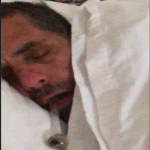-- http://www.umm.edu/patiented/articles/w ... 065_10.htmUvulopalatopharyngoplasty (UPPP)
. . . Success Rates. Success rates for sleep apnea surgery . . . often deteriorate with time, averaging about 50% or less over the long term. . . . Many or most patients with moderate or severe sleep apnea will likely still require CPAP treatment after surgery.
Complications. Uvulopalatopharyngoplasty is among the most painful treatments for sleep apnea, and recovery takes several weeks. . . . The procedure also has a number of potentially serious complications. In fact, in one study, 42% of patients had complaints about the procedure. Some complications include:
*Infection. In one study, this complication was so common that 40% of patients needed another operation because of it. . . . Impaired function in the soft palate and muscles of the throat
*Mucus in the throat
*Changes in voice frequency
*Swallowing problems
*Regurgitation of fluids through the nose or mouth
*Impaired sense of smell
*Failure and recurrence of apnea. In such cases, CPAP is often less effective afterward . . .
According to a 2006 study, patients are more likely to experience complications if they have severe sleep apnea, are overweight, have other medical problems, or undergo other surgical procedures at the same time as UPPP.
Nope. Not for me.




















